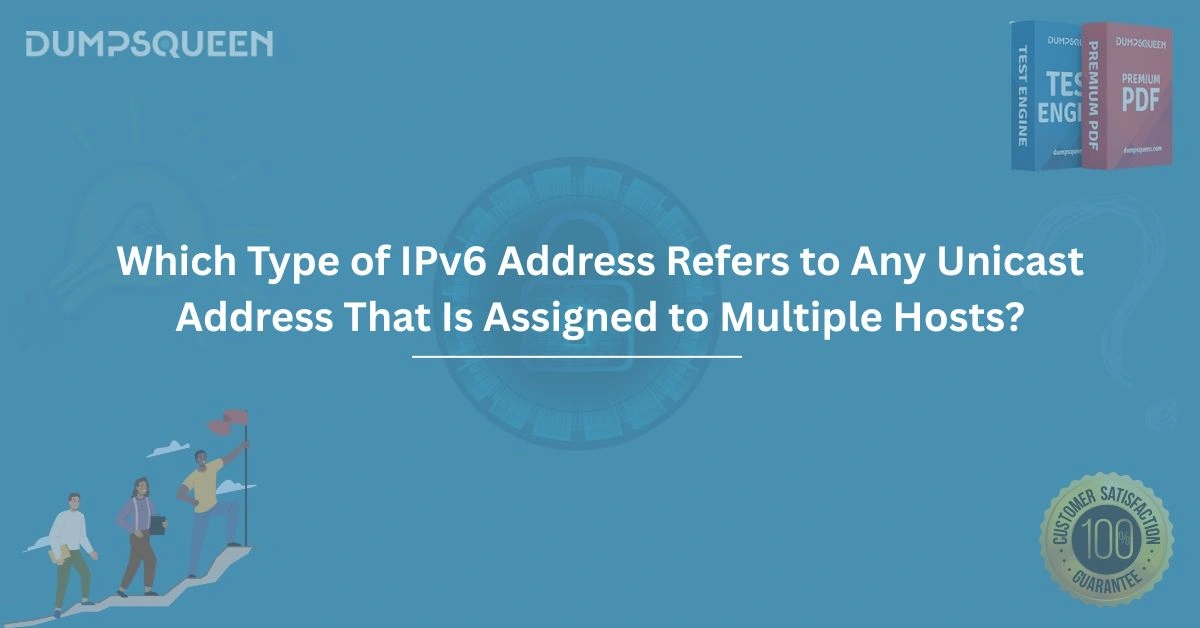Introduction
The transition from IPv4 to IPv6 has introduced a new era of networking, addressing the limitations of its predecessor while offering enhanced scalability and flexibility. As organizations and individuals navigate this shift, understanding the nuances of IPv6 addressing is critical for network administrators, IT professionals, and certification candidates. One intriguing aspect of IPv6 is the concept of unicast addresses, particularly those assigned to multiple hosts, often referred to as anycast addresses. This blog explores the specifics of IPv6 anycast addresses, their functionality, use cases, and significance in modern networking. For those preparing for networking certifications, DumpsQueen provides comprehensive resources to master IPv6 concepts and excel in exams.
The Evolution of IPv6 Addressing
IPv6 was developed to overcome the address exhaustion problem of IPv4, which was limited to approximately 4.3 billion unique addresses. With a 128-bit address space, IPv6 offers an astronomical number of addresses, enabling the growth of the Internet of Things (IoT), cloud computing, and global connectivity. Unlike IPv4, IPv6 introduces a variety of address types, including unicast, multicast, and anycast, each serving distinct purposes in network communication. Understanding these address types is essential for configuring and managing modern networks effectively. DumpsQueen study materials provide in-depth explanations and practice questions to help professionals grasp these concepts thoroughly.
What is a Unicast Address in IPv6?
A unicast address in IPv6 is designed to identify a single network interface. When a packet is sent to a unicast address, it is delivered to the specific device associated with that address. Unicast addresses are the most common type in IPv6 and are used for one-to-one communication. They include several subtypes, such as global unicast, link-local, and unique local addresses, each with specific scopes and applications. For example, global unicast addresses are routable on the public internet, while link-local addresses are confined to a single network segment. DumpsQueen certification resources offer detailed insights into unicast address configurations, ensuring candidates are well-prepared for real-world scenarios.
Introducing Anycast Addresses: The Unicast Variant for Multiple Hosts
The question, “Which type of IPv6 address refers to any unicast address that is assigned to multiple hosts?” leads us to anycast addresses. An anycast address is a special type of unicast address assigned to multiple devices or interfaces, typically across different locations. Unlike traditional unicast addresses, which point to a single device, an anycast address allows a packet to be routed to the nearest or most appropriate device among those sharing the same address. This “one-to-nearest” delivery mechanism is based on routing protocols, which determine the closest host in terms of network topology.
Anycast addresses do not have a dedicated address space in IPv6; instead, they are allocated from the unicast address pool. This means any unicast address can function as an anycast address if assigned to multiple hosts. The flexibility of anycast addresses makes them a powerful tool for optimizing network performance and redundancy. For those studying for certifications like CCNA or CompTIA Network+, DumpsQueen practice exams include scenarios that test knowledge of anycast addressing and its applications.
How Anycast Addresses Work
The functionality of anycast addresses relies on routing protocols, such as Border Gateway Protocol (BGP) or Open Shortest Path First (OSPF), which determine the best path for packet delivery. When a device sends a packet to an anycast address, the routing infrastructure evaluates the available hosts sharing that address and forwards the packet to the closest one, based on metrics like hop count or latency. This process is transparent to the sender, who perceives the communication as a standard unicast transaction.
For example, consider a global content delivery network (CDN) like Cloudflare. The CDN assigns the same anycast address to multiple servers worldwide. When a user requests content, the packet is routed to the nearest server, reducing latency and improving response times. This seamless operation highlights the efficiency of anycast addressing in distributed systems. DumpsQueen study guides break down the technical intricacies of routing protocols and anycast implementation, making complex topics accessible to learners.
Use Cases for Anycast Addresses
Anycast addresses are widely used in scenarios where performance, reliability, and load balancing are priorities. Some prominent use cases include:
Domain Name System (DNS) Optimization
DNS servers often use anycast addresses to distribute queries across multiple servers. For instance, root DNS servers and public resolvers like Google’s 8.8.8.8 employ anycast to ensure users are directed to the closest available server, minimizing latency and enhancing reliability. If one server becomes unavailable, the routing protocol automatically redirects traffic to another server with the same anycast address.
Content Delivery Networks (CDNs)
CDNs leverage anycast to deliver web content efficiently. By assigning anycast addresses to edge servers, CDNs ensure that users access content from the nearest location, reducing load times and improving user experience. This is particularly critical for streaming services, e-commerce platforms, and other high-traffic websites.
Load Balancing and Fault Tolerance
Anycast addresses enable load balancing by distributing traffic across multiple servers. If a server fails, the routing protocol reroutes traffic to another server sharing the anycast address, ensuring continuous service availability. This fault-tolerant design is invaluable for mission-critical applications.
Network Security
In network security, anycast addresses are used for distributed denial-of-service (DDoS) mitigation. By spreading traffic across multiple scrubbing centers, security providers can absorb and filter malicious traffic, protecting the target network. DumpsQueen resources cover these practical applications, helping candidates understand how anycast addresses enhance network resilience.
Configuring Anycast Addresses in IPv6
Configuring an anycast address involves assigning the same unicast address to multiple interfaces and ensuring that routing protocols are set up to handle the “one-to-nearest” delivery. Since anycast addresses are indistinguishable from unicast addresses in their format, the configuration process focuses on the routing infrastructure. Network administrators must configure routers to advertise the anycast address from multiple locations, allowing the routing protocol to determine the optimal path.
For example, in a BGP configuration, each router associated with an anycast address advertises the same prefix to its peers. The routing protocol then selects the shortest path to one of the hosts. Proper configuration is critical to avoid routing loops or suboptimal paths. DumpsQueen certification prep materials include hands-on labs and simulations that guide learners through anycast configuration, reinforcing theoretical knowledge26 and practical skills.
Benefits and Challenges of Anycast Addressing
Anycast addresses offer significant advantages, but they also come with challenges that network administrators must address.
Benefits
-
Improved Performance: By routing traffic to the nearest host, anycast reduces latency and enhances user experience.
-
Scalability: Anycast supports distributed systems, enabling seamless scaling across multiple locations.
-
Redundancy: The ability to reroute traffic to alternate hosts ensures high availability and fault tolerance.
Challenges
-
Routing Complexity: Implementing anycast requires sophisticated routing configurations, which can be complex to manage.
-
Debugging Difficulty: Since packets may be routed to different hosts, troubleshooting connectivity issues can be challenging.
-
Consistency Concerns: In some cases, different hosts may have slightly different data, leading to inconsistent responses. DumpsQueen study tools provide strategies for overcoming these challenges, equipping professionals with the skills to implement anycast effectively.
Anycast vs. Multicast and Unicast
To fully grasp anycast addresses, it’s helpful to compare them with unicast and multicast addresses. As noted, unicast addresses facilitate one-to-one communication, delivering packets to a single destination. Multicast addresses, on the other hand, support one-to-many communication, sending packets to a group of devices that have subscribed to the multicast group. Anycast addresses bridge these concepts, using a unicast address for one-to-nearest delivery to one of multiple hosts.
This distinction is critical for certification exams, where questions often test the ability to differentiate between address types. For instance, a question might ask whether an anycast address delivers packets to all hosts (like multicast) or just one (like unicast). DumpsQueen practice tests include such questions, helping candidates solidify their understanding of these concepts.
Preparing for Certification with DumpsQueen
Mastering IPv6 concepts, including anycast addresses, is essential for networking professionals aiming to earn certifications. DumpsQueen offers a wealth of resources, including study guides, practice exams, and video tutorials, designed to simplify complex topics and boost exam readiness. Whether you’re learning about IPv6 addressing, routing protocols, or network security, DumpsQueen materials are tailored to help you succeed. Visit the official DumpsQueen website to explore their offerings and take the next step toward certification.
Conclusion
IPv6 anycast addresses represent a powerful tool for modern networking, enabling efficient, scalable, and resilient communication across distributed systems. By assigning a single unicast address to multiple hosts, anycast ensures packets are delivered to the nearest device, optimizing performance for applications like DNS, CDNs, and DDoS mitigation. While anycast introduces complexities in routing and debugging, its benefits far outweigh the challenges for organizations prioritizing speed and reliability. For those preparing for networking certifications, understanding anycast addresses is a must. With DumpsQueen comprehensive resources, candidates can gain the knowledge and confidence needed to excel in exams and advance their careers. Visit DumpsQueen today to access top-tier study materials and unlock your potential in the world of networking.
Free Sample Questions
Question 1: Which type of IPv6 address is assigned to multiple hosts but delivers packets to the nearest host?
A) Multicast
B) Unicast
C) Anycast
D) Broadcast
Answer: C) Anycast
Question 2: How does an anycast address differ from a unicast address?
A) It delivers packets to all hosts in a group.
B) It is assigned to multiple hosts and delivers to the nearest one.
C) It is used only for link-local communication.
D) It requires a dedicated address space.
Answer: B) It is assigned to multiple hosts and delivers to the nearest one.
Question 3: Which protocol is commonly used to route packets to the nearest host for an anycast address?
A) DHCPv6
B) BGP
C) ICMPv6
D) RIP
Answer: B) BGP
Question 4: What is a common use case for anycast addresses?
A) Video conferencing
B) DNS resolution
C) File sharing
D) Email delivery
Answer: B) DNS resolution



